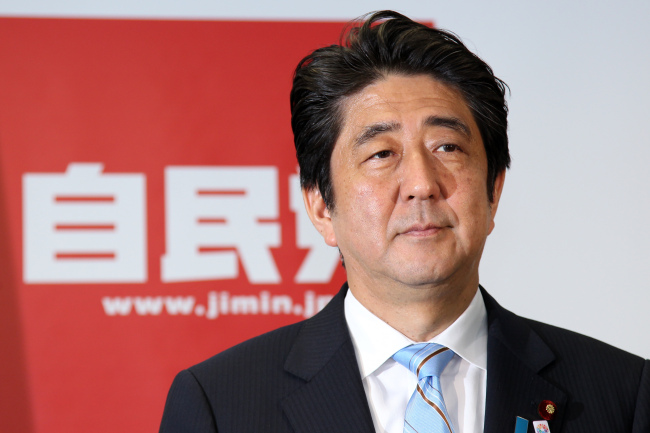Japanese Prime Minister Shinzo Abe’s economic recovery plan is filling the coffers of manufacturers from Toyota Motor Corp. to Sony Corp.
As the exporters prepare to announce first-quarter earnings this week, 14 of Japan’s 27 largest are projected to beat their own full-year operating profit forecasts by 5 percent or more, according to data compiled by Bloomberg. Net income may surge 75 percent from a year earlier among companies that sell abroad and 33 percent at domestic-oriented firms, UBS AG said this month.
Abe’s drive to end 15 years of deflation in Japan through monetary easing and fiscal stimulus benefited manufacturers as the yen dropped 5 percent against the dollar last quarter and about 20 percent in the past 12 months, boosting earnings from overseas. Toyota, the world’s largest carmaker, may exceed its fiscal-year net income target by 21 percent, according to the average of 23 analyst estimates compiled by Bloomberg.
 |
Japanese Prime Minister Shinzo Abe. (Bloomberg) |
“Abe introduced a real bullet,” said Ichiro Takamatsu, a fund manager in Tokyo at Bayview Asset Management Co. “Companies will report stronger numbers because of the weak yen.”
Toyota, set to report earnings on Aug. 2, may say first-quarter net income rose 48 percent to 430 billion yen ($4.3 billion), according to the average of four analyst estimates. Profit for the year ending March may jump 72 percent to 1.66 trillion yen, based on 23 projections.
Sony, Japan’s biggest smartphone maker, may boost full-year profit 28 percent to 55 billion yen, according to the average of 16 analyst estimates. The Tokyo-based company will report first-quarter earnings on Aug. 1.
One question is whether those benefiting from Abenomics will return the favor to stimulate the broader economy. Companies such as Toyota, after stockpiling cash, could bolster Abe’s stimulus efforts by increasing capital investment, wages and dividends.
“Companies are of course happy to receive the windfall from a weaker yen and stronger exports, but extremely reluctant to spread this additional income,” said Martin Schulz, an economist at Fujitsu Research Institute in Tokyo. “They would rather keep that income and focus on investment, particularly overseas.”
Analysts expect exporters including Toyota and Sony to beat their forecasts in part because the yen is trading at lower levels than the companies predicted.
Toyota said in May it expects 1.37 trillion yen in annual profit, based on exchange rates of 90 yen to the dollar and 120 yen against the euro. Sony targets 50 billion yen in full-year net income based on the same projected rates.
Japan’s currency traded at an average of about 99 against the dollar and 129 against the euro in the quarter ended June 30, compared with about 80 yen and 103 yen a year earlier. The currency may weaken further to 120 yen against the dollar over the next year, Credit Suisse AG said in a July 1 report.
Toyota’s operating profit is boosted by about 40 billion yen for every 1-yen weakening in the Japanese currency against the dollar, according to the company.
“We are just at the starting lines toward sustainable growth,” Akio Toyoda, the carmaker’s president, said last month at the annual shareholder’s meeting. He said the strong yen was “becoming corrected.”
Shino Yamada, a spokeswoman for Toyota, and Mami Imada, a spokeswoman at Sony, declined to comment ahead of the companies’ earnings announcements.
“There should be many sectors that will benefit from the yen’s depreciation,” said Masamitsu Ohki, a fund manager at Stats Investment Management Co., a hedge fund in Tokyo. “I expect good numbers for the first quarter.”
(Bloomberg)








